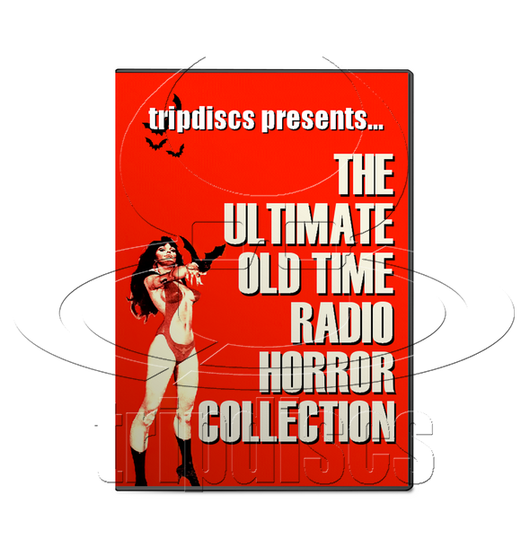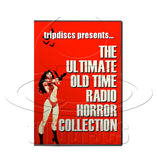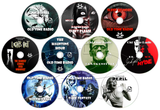The Ultimate Old Time Radio Horror Collection (OTR) Nightfall, Quiet Please, Sleep No More, Lights Out, The Haunting Hour, Frankenstein, Jekyll and Hyde, The Witch's Tale, Dark Fantasy, Peril (10 x mp3 CD)
Regular price
£24.99
Sale

Collection of Ten Classic Old Time Radio Horror Shows
Nightfall
(106 Episodes)
Nightfall was the brainchild of producer Bill Howell, who was best known at the time for his work on CBC Playhouse and the cult favorite adventure series, Johnny Chase: Secret Agent of Space. (Howell later went on to be executive producer of CBC Radio's highly-popular series, The Mystery Project, which ran from 1992 to 2004.) When CBC Radio was revamped and given an expanded budget in 1980, Howell approached the newly-appointed Head of Radio Drama, Susan Rubes, about his idea for a supernatural/horror anthology series that would push the envelope. Though not a fan of the horror genre, Rubes recognized a hit when she saw one and gave Howell the green light to begin production.
Quiet Please
(91 Episodes)
Quiet, Please! was an old-time radio fantasy and horror program created by Wyllis Cooper, also known for creating Lights Out. Ernest Chappell was the show's announcer and lead actor. Quiet, Please! was first broadcast by on June 8, 1947 by the Mutual Broadcasting System, and its last episode ran on June 25, 1949, by ABC. A total of 106 shows were broadcast, with only a very few of them repeats.
Earning relatively little notice during its initial run, Quiet, Please! has since been praised as one of the finest efforts of the golden age of American radio drama. Professor Richard J. Hand of the University of Glamorgan (author of probably the most detailed critical analysis of the series) argues that with Quiet, Please, Cooper and Chappell "created works of astonishing originality"; he further describes the program as an "extraordinary body of work", which established Cooper "as one of the greatest authors of horror radio." Similarly, radio historian Ron Lackmann declares that the episodes "were exceptionally well written and outstandingly acted", while John Dunning describes the show as "a potent series bristling with rich imagination."
Sleep No More
(20 Episodes)
An interestingly different show, Sleep No More offers dramatic readings of thriller stories (often two or three per show) rather than dramatizations by a full cast. Nelson Omstead reads the thrill chills with backup spooky music and fantastic sound effects. This series ran from 1952 to Nov 1956 as 15 minute shows and then on as 30 minute shows. Get out the butter churn and get your blood curdling because Sleep No More will really thrill!
Lights Out
(97 Episodes)
Lights Out debuted in 1934 and was radio's premier horror series created by writer/director Wyllis Cooper, who later scripted Boris Karloff's 1939 classic Son of Frankenstein. Wyllis Cooper was a innovative radio writer and worked on other notable shows such as The Empire Builders, Quiet Please, Campbell's Playhouse, The Army Hour, and Whitehall 1212. Lights Out truly set the bar high for other radio dramas in the 1930's due to its gore and strangeness. It was one of the first old time radio shows that developed the medium of radio with distinct sound effects and dramas intended to be heard.
"Adhesive tape, stuck together and pulled apart, simulated the sound of a man's or woman's skin being ripped off. Pyulling the leg off a frozen chicken gave the illusion of an arm being torn out of its socket. A raw egg dropped on a plate stood in for an eye being gouged; poured corn syrup for flowing blood; cleavered cabbages and cantalopes for beheadings; snapped pencils and spareribs for broken fingers and bones. The sound of a hand crushed? A lemon, laid on an anvil, smashed with a hammer."
Cooper was succeeded by Arch Oboler, one of radio's greatest dramatic talents. Oboler had scripted the Mae West's infamous "Garden of Eden" sketch and brought a new level of psychological horror to radio in scripts like "Cat Wife," "Sub-Basement," and "Chicken Heart." Though most famous for his film roles, Karloff was an accomplished radio performer who hosted his own series Boris Karloff's Treasure Chest and narrated Radio Reader's Digest broadcasts during the final two decades of his life.
Lights Out debuted in 1934 and was radio's premier horror series created by writer/director Wyllis Cooper, who later scripted Boris Karloff's 1939 classic Son of Frankenstein. Cooper was succeeded by Arch Oboler, one of radio's greatest dramatic talents. Oboler had scripted the Mae West's infamous "Garden of Eden" sketch and brought a new level of psychological horror to radio in scripts like "Cat Wife," "Sub-Basement," and "Chicken Heart." Though most famous for his film roles, Karloff was an accomplished radio performer who hosted his own series Boris Karloff's Treasure Chest and narrated Radio Reader's Digest broadcasts during the final two decades of his life.
Dark Fantasy
(27 Episodes, Plus Intro)
Dark Fantasy was a short series with tales of the weird, adventures of the supernatural, created for you by Scott Bishop. The series aired as a horror drama on NBC between 1941 and 1942.
Dark Fantasy was a series dedicated to dealings with the unknown. Originating from radio station WKY, Oklahoma City, it was written by Scott Bishop (of Mysterious Traveler and The Sealed Book fame) and was heard Fridays over stations. Tom Paxton served as announcer. The shows covered horror, science fiction and murder mysteries. Although a short series, the shows are excellent with some stories way ahead of their time. The following is a news promo promoting the show:
Every since Lights Out went out several years ago, fans of the fiendish have been clamoring for more good old goose-pimple horror drama on the air. Now they have it. One of the programs that currently freezes the airwaves with its chilling stories is Dark Fantasy comparatively new to the networks. In the late hours of Friday nights these shivery, shocking stories go out over NBC - right straight from Oklahoma City, which you might not have thought of as headquarters for haunts. Station WKY is the home of the Dark Fantasy plays, and the writer is Scott Bishop, who lives in the midst of mystery and the supernatural, represented by the innurnerable volumes of thriller fiction, fantasy lore and all kinds of horror literature that fill his home andhis office. Bishop has long contributed to network broadcasting and to magazines. He says, "Give the listener enough material to let his imagination go to work, and he'll supply his own goose-pimples." Dark Fantasy has been furnishing plenty of such material since last November. And judging from enthusiastic comment, the horror fans are responding with goose-pimples galore! Tune in every Friday on Station WKY Oklahoma City.
The Haunting Hour
(38 Episodes)
This old time radio show was billed as "Mystery at its Best" solves psychological mysterie, "whodunit" thrillers and crime crusades with a cast of network stars.
The Haunting Hour is a very mysterious show. First, let's note that the Haunting Half-Hour would actually be correct, but an odd title for the show. So Haunting Hour it was.
The second mystery is that, like so many of the great radio talents who labored in the background, unseen and unheralded, this show made for transcription has receded into the ethers of old time radio without a history. That is, the Magister Ludi of Old Time Radio himself, John Dunning, succinctly states in "On the Air, The Encyclopedia of Old Time Radio,""There were no credits, so casts and production crews are unknown."
Vanished without a trace? Were they really there, making real radio? The answer is yes, and the following set of shows proves it. Perhaps you, the kind listeners, might give us a clue to the talents involved. Or were we all just imagining it? It sounds like a plot for another Haunting Hour.
The shows are classic chills from the old school, with creepy organ, overwrought women and over the top men. Perhaps not the highest of melodrama, but obsessively workmanlike. After all, they might have known they were a skeleton staff toiling relentlessly without a ghost of a chance of fame. Thanks to transcription, these unknowns are still with us.
See also the some of the classics of thrills and horror: Suspense, Inner Sanctum, Lights Out, Mysterious Traveler, The Whistler, Witch's Tale, Escape and I Love a Mystery. Also recommended are the Dark Fantasy, Mystery in the Air, Hall of Fantasy, Unexpected, Weird Circle, Strange Dr. Weird, and the many detectives and operatives whose lives are littered with clues and corpses.
Peril
(24 Episodes)
Peril, stories of suspense, is a syndicated old time radio show. The plots of the shows vary from week to week but most of the shows deal with the topic of the limitation of human morality.
Four actresses receive an invitation to a deserted house only to be trapped by a murderous fiend.
Two conjoined brothers (who argue a lot and are in love with the same woman) plan to be separated; the operation is complicated when one of the twins will not survive.
A woman and her boyfriend kill her disabled husband, who happened to be filthy rich.
The plots of Peril are original and well constructed, the characters of complex, and the acting is surprisingly good as there are not many recognizable actors in this show. The conflict of each show builds and there are twist and turns.
Frankenstein
(13 Episodes)
Frankenstein, or, The Modern Prometheus is a novel written by the British author Mary Shelley. Shelley wrote the novel when she was 19 years old. The first edition was published anonymously in London in 1818. Shelley's name appears on the revised third edition, published in 1831. The title of the novel refers to a scientist who learns how to reanimate flesh and creates a being in the likeness of man out of body parts taken from the dead. In modern popular culture, people have tended to refer to the Creature as "Frankenstein" (especially in films since 1931).
Frankenstein is a novel infused with some elements of the Gothic novel and the Romantic movement. It was also a warning against the "over-reaching" of modern man and the Industrial Revolution, alluded to in the novel's subtitle, The Modern Prometheus. The story has had an influence across literature and popular culture and spawned a complete genre of horror stories and films. The novel questions many debates that can be linked to today's culture. The evolution of man and the extent to which man collects knowledge can ultimately backfire and fail to produce any good outcomes.
Dr. Jekyll and Mr. Hyde
(58 Episodes)
Dr. Jekyll and Mr. Hyde is an English language radio drama based on the same novel by Robert Louis Stevenson. This radio adaptation takes some liberties from Stevenson's novel, like Henry Jekyll being in his 20s rather than 40s as mentioned in the novel, and having an element of romance. There are 52 fifteen-minute episodes, painting Henry Jekyll's life from childhood till his miserable death.
The Witch's Tale
(43 Episodes)
Begun regionally on WOR radio in New York, this is one of the earliest of the horror genre shows. It also helped begin a trend in creepy hosts that "lives" on to this day in popular entertainment. "Old Nancy, the witch of Salem," was the cackling host of the show, and she was a caution! She quickly became a favorite of New York kids in the 1930's, who imitated her quips and cackles to scare their younger brothers and sisters at night.
Since Nancy was a witch from Salem, she knew of the old days, and relished a historical, and often hysterical, setting with her charming cat, Satan!
John Dunning in his "On the Air, The Encyclopedia of Old Time Radio" relates the odd tale of getting the replacement for the original Nancy, Adelaide Fitz-Allen, who died at 79 in 1935. A radio veteran, only a mere 13 years old, Miriam Wolfe by name, was then on the fine children's program, Let's Pretend. Of course, she wasn't considered for the part. She stayed in the studio during a late-night broadcast by Witch's Tale writer/director, Alonzo Deen Cole, and began her "Nancy" without warning. Cole was so chilled by her mimicry of an ancient crone that she got the part on the spot. Later in the show's run, the role was taken by Martha Wentworth.
The Witch's Tale was sometimes forced and obvious, but the good New York radio actors, ably directed by Roger Bower, transcended the occasional clunky scripting to be generally quite bold and horrifically enjoyable. The classical music used as interludes for commercials adds some class and charm to the preternatural proceedings. The scripts would sometimes use famous horror tales, such as Frankenstein or the Flying Dutchman. The show enjoyed popularity both the New York regional and Mutual national runs. As a sidelight, an Australian version of the show is included in this compilation. But real fans would scream that they don't hold a candle to Old Nancy! When she started her spiel to Satan's bawling (one wonders who did the cat role) - the mood was right for another fright! Old Nancy was certainly the horror hostess with the mostess in those days. Why, today, she'd be crowing about being "183, I be today, 183" Be that as it may, you can now revisit her in her younger years, when she was just pushing the century mark.
For other horror hosts, listen to favorites such as Raymond, of the Inner Sanctum, the Man in Black of Suspense, The Whistler, Mysterious Traveler, and The Strange Dr. Weird.
Format: 10 x mp3 CD.
Contained in: Large DVD Sized Case.



